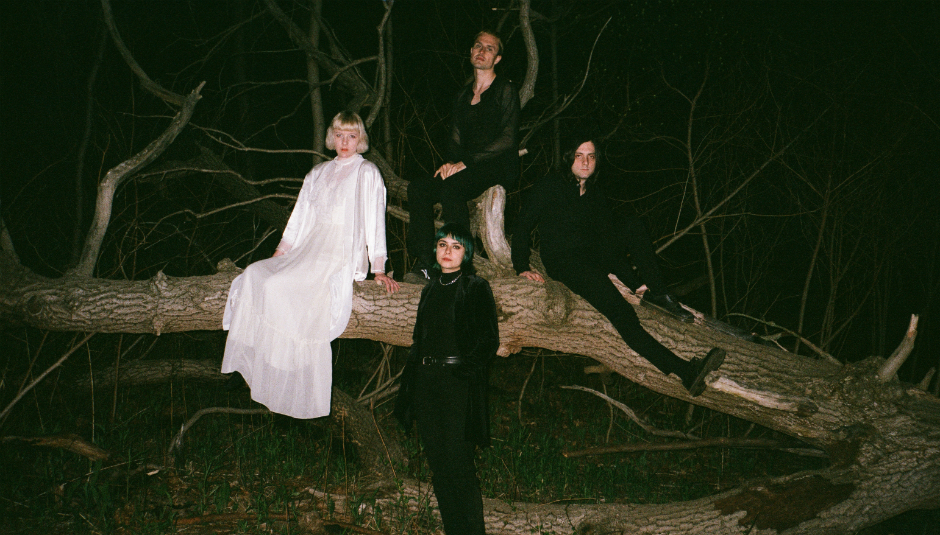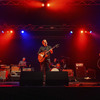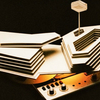Dilly Dally are a Toronto four-piece band who have returned from the brink of self-destruction. Their debut album Sore was a visceral offering of grunge-punk where lead singer and guitarist Katie Monks’ shrilling vocals are the focal point. Critical acclaim and world tours soon followed, but by the end of touring Sore, the quartet were close to dissolving as a band, their future in severe doubt after their members struggled with sustaining their mental health and coping with substance abuse and recovery. It’s the sort of exhaustion that so accompanies musicians on tour.
Now, though, they have rebuilt themselves from the ashes of their near-dissolution with their excellent follow-up Heaven. Combining the raging soundscapes of their signature gutter-punk and searing ferocity, Heaven is a record about survival, mental hardship and self-care. Dilly Dally were so close to no longer being a band and were on the verge of a collapse, but Heaven is an auditory toolkit on preserving mental health, learning how to say “no” and take a step back, and a deep an emotional journey into self-discovery – and self-love.
DiS: I know that for a little while after your last few tours around Sore, there were questions about Dilly Dally’s future and if the band would even continue. Did you have any intention to write a second record, or did you think – after everything that happened – that that was that?
Katie Monks: We didn’t have any plans to record right after. We didn’t have plans for anything. We were being offered to, but we just kept declining; we were burnt out. There were mental health struggles, and there would be a lot of tension in our relationships with one another. We don’t force the writing process at all – each song is an awakening of some kind for me. It comes from a real place of, “Oh my god, a bunch of shit just happened and I have this idea and I need to stop what I’m doing and just go and I need to write this song.” It just has to be natural. I suppose it ties in with why we’re called Dilly Dally, as well.
What usually motivates you to write? I know a lot of the material on Heaven is about the near-breakdown of the band and recovering from the mental and exhaustion that comes so often with touring.
We did this tour in the States that was a couple months before the election, and there was a wave of depression across the whole country. We played in Washington DC the day after Trump was elected. Everybody at every other show on the tour was silent. I remember just playing the first couple of songs of the set and then this one guy in the front row just shouting, “AMERICA SUCKS!!!” Everyone could hear him.
That’s amazing.
Everyone just fucking cheered so loudly. What I really realised was like, woah, everybody here really needs people and are looking to artists to acknowledge what they’re feeling. Getting to tour all over – even being in England – I was really getting a sense of people that were paying attention to us. I have to really turn inside and dig real deep so I can stand on stage and have something to say to all these people.
I know a lot of Americans seem to view Canada as this idea of some perfect Utopia that they can somehow escape to when this country gets run down to the ground.
There are people here who are Trump supporters. There’s definitely been a right-wing resurgence happening. It’s terrible. It’s scary. Canada is not as loudly oppressive as America is, but it’s silently oppressive and racist. And I would say that those problems do exist here… we might not have as many guns, but there are murders and violence. And there’s the Jordan Peterson movement that’s been happening – the Canadian university professor who lectured why white male privilege is non-existent.
Oh dear God.
Yeah. It’s fucked-up. There are white supremacist signs at parks in Toronto, Neo-Nazi signs.
It was weird for me, spending the majority of my time in New York and then moving to another country and then a different state after the election. I didn’t realise how much of a liberal bubble NY was. I was confident heading into the election, just based on the people I’d associate with – but it’s just not an accurate representation of America. It’s a huge privilege to be able to live in a bubble like that.
Totally. Once you drive around… it’s a privilege to be able to live in those bubbles. Certainly, I do, as well. But I’m so grateful in an environment where I felt like I could come out to my friends being queer, or if I could walk on the streets smoking weed, and I have so many different friends from different cultures.
I know there’s a lot of discourse about so-called liberals needing to move to conservative states. But I don’t want to move to a state filled with people who believe that I don’t have a right to be in this country! I don’t want to waste my time talking to racists.
I’m happy that I grew up here and not somewhere like Ireland, for instance, where abortion only became legal this year. But, like, at the end of the day… the liberal bubble is dope.
Totally. Do you feel that your approach to songwriting has changed with everything that’s happened in the political sphere within the last two years? Like, do you feel more inclined to address certain issues with your music?
Honestly, with everything happening in the political climate, it just makes me feel really… oppressed. It makes me feel powerless. Heaven is not overtly political as much is it is offering advice for self-care, and self-love, for people who struggle with depression. I mean, there are all these questions and these big grey clouds in this world. Like, why do people commit suicide? Why are people racist? Why do women get raped, and why don’t they have a voice? There are just so many questions. I don’t know if it’s because I got to a certain age, or if it’s because of the touring, or because the world became so overwhelming. I didn’t know what to say anymore, what to fight for. I just thought, well, I’m pretty privileged to be able to go back up to Canada and be white and write a record. When I did that, it felt like the most that I was able to offer. I wanted to offer people who were just as overwhelmed or depressed some hope – but also acknowledging the darkness.
Is writing an escape for you from the political oppression in North America?
It’s hard to say it’s an escape when it’s my job. Like, now I need an escape from the escape.
But is it crucial for you to make that differentiation?
I have to make that differentiation, in order to make this album, and that’s part of the reason why I think it took so long. There was a question mark about whether or not my bandmates were going to be able to continue doing Dilly Dally with me. Or if Dilly Dally was going to move on at all. Dilly Dally is a little bit more my baby than it is my bandmates’, and I realised that I couldn’t take it for granted. When everyone did want to show up for practice one day… there was some magic about it.
What do you think ultimately led your other band members to continue on with Dilly Dally, after everything that happened?
I can’t speak for everyone, but I think a big part of it was always making it seem as if the band was ride or die. Like, if you’re in 110 million percent, or you’re out. Whereas I think I matured and I had to go back to the band and say, you know what, actually, it’s not black and white. And this needs to work for all of us, and I can’t do this without you guys. Whatever it is, this has to work for us and our mental health, or else the music will suffer and the art will suffer. So that mentality in the music industry of this competitiveness where it is ride or die… it’s not true for us. In order to operate, we need to be healthy. I can say for myself that I’m in this for the long haul, so if there’s a fuck-up here or there, or a missed opportunity, the big picture is still looking bright. I’ve got endless more records inside of me.
Do you think touring and all that becomes glamorised in the music industry? I’ve realised more recently after talking to more bands the mental and psychological impact touring has. It’s not always as shiny as it seems.
There are two sides to the coin. On one hand, you’re showing up in a new city that you’ve never been to, to a room filled with people who want to be your best friend. Which is insane. It’s surreal. And, on top of that, the shows are amazing. No matter how dark things got with Dilly Dally, internally, there was never a moment where anybody said that they didn’t love playing live. That’s always incredible. But being in a van with the same three or four other people for two years straight, and not in separate rooms... and even every little thing you say, you overthink it. Oh, that tone that she had, or the way that he asked me that question…
So like a cabin fever-type feeling?
It fucks with your head. But my intent is to find ways to meditate on the road and to journal, so that I have a dialogue with myself, and something that’s wonderful is Skyping with friends just to get that taste of home. And to tell yourself that you aren’t crazy.
Can you tell me about ‘Doom’? It’s my favourite song on the record. I think what I love most about your music is that the guitars and your vocals are super feral and abrasive, but juxtaposed by the rawer, more vulnerable lyrics. You sing: “If I make it”. It’s super dark and fatalist.
That song is about flying back from tour, from one of the darker tours in Europe, when we all thought we were breaking up – I thought the band was over. There was trouble in my family and my band members’ personal lives, and there was a lot of dark energy. That song is about being able to find hope within all of that. I was writing it, months after the fact in my bedroom in Toronto, when my roommate came in and told me about some terrible one-night stand that she had. This guy had said all this misogynistic stuff to her. And she was like, “You need to leave”. She told him: “My body is sacred. And that you’re not allowed inside my body anymore”.
So it’s about reclaiming yourself?
There’s something spiritual about it. It’s like, you have to not lose your hope and faith in humanity no matter how grim it gets. Depression is when you’ve lost that. This song, ‘Doom’, is a fight against that – the whole song is just those two voices going back and forth against each other. It’s about reaching inside yourself for hope.
You lay out the state of your headspace within the lyrics, especially – like in ‘Believe’. Is that addressed to your bandmates? Or yourself?
That song was my mantra for finishing the record. I didn’t feel like anyone else believed in me! I didn’t feel that my band members did. I’m the bandleader – if I don’t believe in myself, how can anyone else? My confidence was pretty shattered because I thought Dilly Dally was going to fix my bandmates’ problems and struggles with depression and addiction, but it didn’t fix anything at all. It’s actually hurting my friendships. That was a confidence hit, because I was like… Fuck. I had been leading my best friends into this shit-show, which is the music industry. And everyone’s falling apart. Little did I know that I had to take time alone and away from social media, and I needed to go on a spiritual journey and find myself to come out with an album. This tool book for the road, or for life.
What do you hope will change within the music industry so that artists will take better care of their mental health while still dealing with insane amounts of pressure?
I’m doubtful anything will change, but what I suppose should change is that artists need to never, ever sacrifice what they are trying to make for anybody. And nobody should feel pressure. None of this should be at the expense of your mental health. I’ve learned that people are going to keep pulling at you until you tell them no, and you really have to know what your boundaries are. I don’t think the industry is going to change because it’s business. I think that artists can try to listen to each other and stop competing with each other as much and trying to be supportive. It’s a highly unique experience and it’s an isolating experience – in that the rest of the world thinks that your life is completely different to what it actually is.
Heaven is out now via Partisan Records. For more information about Dilly Dally, including forthcoming tour dates, please visit their official website.
Photo Credit: Michelle Homonylo






















